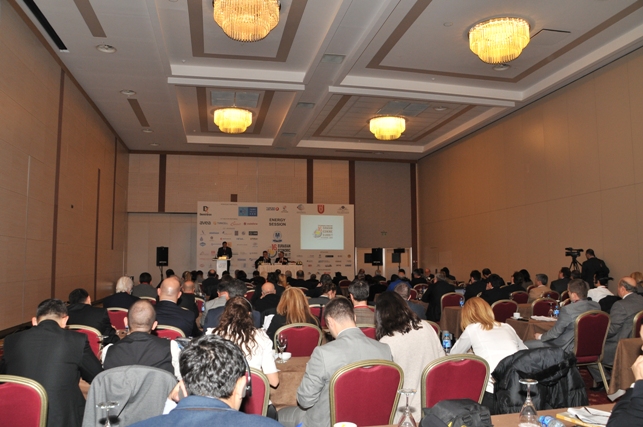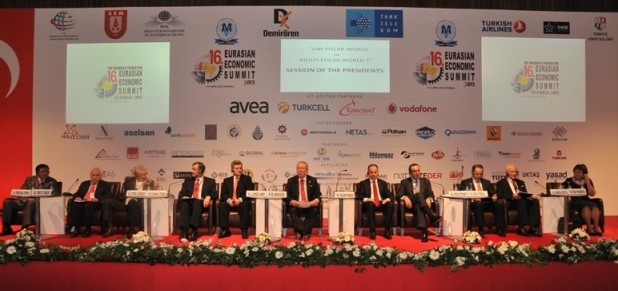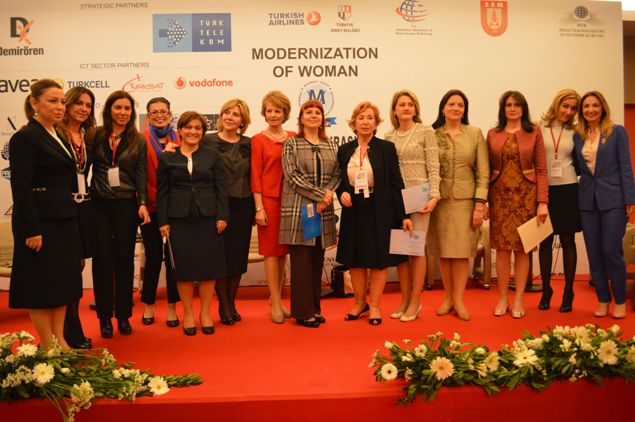16th Eurasian Economic Summit Completed Successfully
16th Eurasian Economic Summit, which was organized by Marmara Group Foundation for 16 years, represented enlightened face of Turkey to world once again with its works in political, economical and inter-cultural dialogue areas.
16th Eurasian Economic Summit, which started in the Gala dinner at Ritz Carlton Hotel with support of İHKİB including a fashion show from famous designer Gül Ağış and famous diva of Azerbaijan Tunzale various topics including “economy, energy, health, education, ecology, ICT, defense and modernization of woman”.
.jpg)
In the Summit, which was attended by 52 countries; opened by messages of President of Turkey Abdullah Gül, President of Azerbaijan İlham Aliyev and General Director of Irina Bokova.
Turkish President Abdullah Gül has stated that he believes countries in Eurasia will play an important role in shaping the new global structure.
In his message to the 16th Eurasia Economic Summit, Gül noted that the Summit, which would discuss the new global structures and cover the topics of women’s role in development and assess the economic, political, energy, health, educational and cultural fields of the Eurasia region, would study opportunities for further regional and international cooperation.
The Turkish president drew attention to the position of the Eurasian geography, stating that the importance of the region’s future role could not be denied with the power balance shifting from West to East and from North to the South.
.jpg)
Gül said the summit would help facilitate regional and international cooperation, describing the event as “an important platform” and particularly noting that the focus subject of the event, “Uni-polar or multi-polar world?” was the right subject to discuss
President of Albania Bujar Nishani, President of Kosovo Atifete Jahjaga, President of Macedonia Gjorje Ivanov, Governor of Autonomous Unit of Gagauiza-Moldova Mihail Formuzal, President of Senate of Jordan Taher Masri, Chairman of Parliament of Ethiopia Abadula Gemeda, Vice-President of Ghana Kwesi Amissah-Arthur, Vice-President of Azerbaijan Prof. Dr. Ali Hasanov, Prime Minister of Madagascar Omer Beriziky and 34 Ministers attended to 16th Eurasian Economic Summit
16th Eurasian Economic Summit broke grounds. First of these is, instead of plaque, a certificate of “Now you too have a planted tree in Turkey” is given to participants. Herewith, Eurasian Economic Summit plantation area, which is assigned by Prof. Veysel Eroğlu, started to afforested.
Economic crisis in Europe brought into question. Social effects of the crisis emphasized.
Promotion of Izmir’s candidateship to Expo 2020 supported by participators of Summit.
State of Montenegro made a gesture and announced that they published Dr. Akkan Suver book about Montenegro in their own language.
.jpg)
Dr. Suver, who made the opening speech of Eurasian Economic Summit said:
Your participation in the Eurasian Economic Summit this year, organized by the Marmara Group Foundation for the sixteenth time, is a great source of honor.
The Eurasian Economic Summits, which have occurred without interruption for the past sixteen years, now reaches far beyond the region. Its reach extendsto Africa and to Latin America. With us today are:
President of Albania, his excellency Bujar Nishani,
President of Macedonia, his excellency Gjorge Ivanov,
President of Kosovo, her excellency Atifete Jahjaga and
Başkan of the Autonomous Territorial Unit of Gagauzia, his excellency Mihail Formuzal.
I welcome all of you with the utmost respect.
Also, I would like to extend my warmest welcome to the Vice President of Ghana, his excellency Kwesi Amissah-Arthur.
With us today is the President of the Senate of Jordan, Mr. Taher Masri,
Speaker of the Ethiopian Parliament, Mr. Abadula Gemeda,
And I warmly greet the Speaker of the Grand National Assembly of Turkey, Cemil Çiçek. Welcome to Istanbul.
I respectfully welcome the Prime Minister of Madagascar Omer Berizy,
Former President of Bulgaria, his excellency Petar Stoyanov,
As well as Former President of Bulgaria, his excellency Zhelyu Zhelev,
Former President of Estonia, his excellency Arnold Rüütel,
Former President of Kyrgyzstan, her excellency Roza Otunbayeva,
Former President of Moldova, his excellency Petru Lucinschi,
Former President of Mongolia, his excellency Punsalmaa Ochirbat,
And former President of Slovenia, Danilo Turk. It is wonderful to see you all here with us.
Additionally, it is with great pride that I can say we have thirty-six ministers from fifty countries among us today.
For a civil society organization the importance of these activities, of bringing this international conference to fruition for sixteen consecutive years, is far greater than mere continuity.
Over the course of these sixteen years, our rising profile and increasing participation has been a success of a different kind altogether.
And this year, the presence of dignitaries from the countries of Africa and Latin America has introduced a new dynamic to our mission.
At the beginning of my remarks I would like to note to the high-level delegations before me that from the point of view of civic initiative, this cooperation between state and nation is a rather important achievement.
I congratulate all of my friends who through their efforts are the authors of this success.
The noble and idealistic Summit at which we find ourselves will enter history as an event of great consequence in the name of peace, in the name of responsibility, and in the name of humanity.
For this reason I honor all of you, wish you success, and offer you my deepest respect.
Respected guests,
In the regions of the Balkans, the Caucasus, the Middle East and North Africa, the status quo is shifting. We, as a civil society organization, must listen to words of those within the political order, with attention to each country individually. We must not turn our eyes away from the stage of international politics as whole.
Unfortunately, the current state of ties among international civil society trails far behind that of international economic cooperation.
We look upon the inability to reach a level of cooperation in the field of civil initiative commensurate with that of international economic relations with regret.
Subsequently, it is quite clear that, due to the rapid changes in information technology, we are in the midst of a rebuilding process of indeterminable length.
As members of the Eurasian Economic Summit, we believe that we will make substantial contributions to this rebuilding process. Furthermore, our age is an age that will belong to the words of civilians.
Dear attendees,
We, as the Marmara Group Foundation, do not look at Eurasia as a geographic unit. For geographers, it is just a continent. In fact, if we were to draw the borders in accordance which the reach of Eurasia’s riches, America and Africa would also find a place on that map. I consider Eurasia to be a value system.
I believe that the day Eurasia establishes a political and economic union a gateway to a new way of life will open.
At the same time, it would be wrong to evaluate Eurasia based on its religions, languages, lands, and nations. In Eurasia there is Islamic civilization and Greco-Latin civilization. And in Eurasia, aspects of Turkish culture, Mediterranean culture, African culture, Christianity, German, Russian, and Chinese culture are present.
We see this as the distribution of this civilizational project’s peace and prosperity.
The civilization that emerges from the synergy of thought, art, culture, politics, and economics—that is the central doctrine of Eurasia. It is its strategy. In broader terms, it is a product of the glorious past of Eurasian culture. The reason for the existence of this modern Eurasian philosophy is people. Thus the Eurasia we represent is a project for all humanity.
That is why Africa is here, why Latin America is here, why China and Italy together with Madagascar and Mongolia are all together under one roof.
Together under one roof we also have two much respected women. One comes from Central Asia, the other from the Balkans. From the perspective of our society, these are extremely important and valuable women. One is the former President of Kyrgyzstan Roza Otumbayeva. The other is President of Kosovo Atifete Jahjaga. I welcome these two women with my deepest respect and admiration.
Individuals like them form the foundation on which our success is built
Dear attendees,
I would like to share a few words with you about my country, Turkey.
Turkey is a country and society with a global profile and global reach. For centuries Turkey was linked to Europe, especially the Balkans, through the region we still call Rumeli. It is a Muslim-majority country with deep cultural and religious connections to the Arab world.
It was the Caliph of the Ottoman Empire that centuries ago opened his arms and warmly welcomed the Jewish community expelled from Spain.
It is a country with strong linguistic and, now, economic ties with Central Asia.
It is a country that’s interests and investments extend to Africa.
Since the Korean War’s outbreak in 1950, in which it provided the second largest military contingent to the United Nations Command after the United States, Turkey has been a strong ally and friend of the West.
And Istanbul, today a global metropolis, is aspiring to host the 2020 Olympic Games.
And Izmir, Turkey’s third largest city, is a candidate to host Expo 2020.
As of 2013, Turkish Airlines flies to more countries than any other airline. As someone who flies quite a bit, I recommend that you fly Turkish Air.
Our world is confronting new, tremendous, and global problems that must be solved. To solve most of these problems—the energy bottleneck, climate change, facilitating strong and sustainable economic growth, global trade and finance, confronting terrorism and nuclear proliferation, halting the spread of infectious diseases—strong and global cooperation is necessary. The panels that we have organized will have all of these issues on their agendas.
In this era, nothing can be achieved through brute force and by excluding other countries. In every place young people are looking across borders for examples of how to achieve happiness, independence, and prosperity. I believe that we must all be good examples and that is why we must support each other.
If we are successful at home, we will also be successful in the international realm. Similarly, if we cannot solve our own problems, how can we contribute to solving the world’s problems?
The decade before us will be challenging years. Economic, political, civil-society, or academic activities—whatever it may be—we have much work to do. Nevertheless I am hopeful and confident that in 2023, the 100th anniversary of the Republic of Turkey founded by the Great Atatürk, we will be looking forward with confidence to the rest of the 21st century, celebrating the achievements of the Republic and democracy together.
Dearest guests,
In past years the Marmara Group Foundation has been the source of a great number of firsts. This year, at the sixteenth Eurasian Economic Summit we have decided to not give gifts or plaques. Instead, our Minister of Forestry and Waterworks Prof. Dr. VeyselEroğlu has done us a great service. He has dedicated a plot of land to us, and we will plant trees on this plot of land. And the minister himself will honor us with his presence today and address this subject.
In the information you will receive at the 16th Eurasian Economic Summit, you will find a document titled “Now I have a Tree Standing in Turkey” that carries the signature of our minister. It is presented in honor of your participation in this summit.
God willing, in ten years we will have a picnic under the trees of the Eurasian Economic Summit Forest and remember these days.
Ladies and gentlemen,
I welcome and greet our distinguished delegations with the wish that the work of the 16th Eurasian Economic Summit contributes to a peaceful future.
.jpg)
Session of Energy

In two energy panels of 16th Eurasian Economic Summit, participants talked over problems and solutions in the main regions of Eurasian geography.
In the first panel moderator was Chairman of 16th Eurasian Economic Summit Energy Committee Necdet Pamir. Minister of Energy of Romani Constantin Nita, President of Global Resources Mehmet Öğütçü, Federal Minister of Energy, Mining and Industry Erdal Thrulj, Special Representative for Energy of Romania Mihnea Constantinescu, CSIS Turkey Project Director Dr. Bülent Ali Rıza, CSIS Energy and National Security Program Senior Fellow Edward CHOW and SOCAR Turkey CEO Kenan Yavuz talked over “Greater Caspian and Black Sea Regions: Challenges and Solutions’’
Panel opened with framework speech of Former Prime Minister of Italy Lamberto Dini. In this panel, it is remarked that, fossil fuels like oil, natural gas and coal constitute nearly %90 of world energy consumption. It is also remarked that, in the process of sharing of these resources there were different factors that makes countries come closer or become distant; creating opportunity for cooperation or conflict. It is stressed that, in spite of enough resources, in order to put these resources into service there is a need for 40 trillion dollars until 2035 in global scale. And in order to make these huge investments, first of all there should be stability in the potential investment regions, participants said.
Moderator of Second Panel was, CSIS Turkey Project Director Dr. Bülent Ali Rıza and the headline of the panel was “the Middle East, Mediterranean and Africa: Challenges and Solutions”. Former Minister of Foreign Affairs of Greece and Member of Greek Parliament Dora Bakoyannis made the opening speech for panel. In her speech, Bakoyannis underlined that, Turkish-Greek friendship will greatly contribute usage of energy resources in region. Participants agreed that, game changer country in the region is Iraq, with its resources above past estimations. However, in order to develop these resources and stability, all parties should come to a legal agreement in a solution. Another game changer region which was included in the panel was East Mediterranean. Natural gas exploration in the recent years increased attention to region, however in order develop and market regional resources, it is a prerequisite to assure stability. Turkey, with its increasing energy and natural gas demand, come to the fore as the market country for these resources. Another region, which was widely talked over was Africa, with its energy resources. One of the most controversial subjects of the second panel was renewable resources, especially solar power. It is remarked that, with its decreasing first costs, these clean resources are creating revolutionary changes. It is especially underlined that, an increase in the rate of resources like sun power and wind power in the energy mix could be a solution not for to global warming, but also to countries’ external dependence.
Modernization and Women Session
President from Albania, Kosovo, Macedonia, Gagauzia and the six former presidents, First Ladies, then Turkey, Jordan and Ethiopia’s Presidents of Parliament, Madagascar Prime Minister, Ministers, official, spiritual leaders, man and women from business world, executives, leaders of civil society participated in the 16th Eurasian Economic Summit, which was held in WOW hotel.
After the morning opening session, in the afternoon Summit continued in seven different parallel session.
Mujgan Suver who was coordinating the “Modernization and Women” session, was in the rostrum accompanied by Journalists Tijen Mergen and Nilgün Cerrahoğlu.
In the session which started at 14:00 and finished at 17:00, spouse of Istanbul Governor Gül Mutlu and Mujgan Suver welcomed the participants. Key note speech was held by the president of Kosovo Atifete Jahjaga.
In the session “Level of Modernization, Women’s Modernization Experience Session” which was moderated by journalist Nilgün Cerrahoğlu, Crown Princess of Romania Princess Margarita, First Lady of Albania Odeta Nishani, First Lady of Macedonia Maja Ivanova, Deputy Minister of Family and Social Policies Aşkın Asan, Consul General of Switzerland Monika Schmutz Kırgöz and Kosovo Deputy Prime Minister Mimoza Kusari Lila expressed their opinions.
In the session “Press in Modernization, is NGO and Women Parliamentarians Proactive or Reactive? What should be Future Perspective?” which was moderated by journalist Tijen Mergen, Chairwoman of Azerbaijan Women Journalists Sevil Yusifova, Executive Editor of Yeni Asır Newspaper Şebnem Bursalı, Turk Vodafone Foundation President Hasan Süel, Chairwoman of Turkish Women’s Union Sema Kendirci , Member of Parliament from AK party Öznur Çalık, Member of Parliament from Malatya CHP party Aylin Nazlıaka shared their views and experiences.
The Modernization and Women session which was listened by the 200 participants concluded:
When we look at the perspective of the future of our region, as opposed to in front of the developed western world, we see two problems.
First is a late modernism and second are problems that modernism have.
Our country and countries in our region, must fine together solution for this two problems.
Evolving events in the historical process has showed us flow through the regime of democracy.
Is modernization necessary? – We may say.
If we cannot create a superior value of developed countries’ socio economic, technology and culture values our answer would be still “yes”.
Session of Culture and Ecological Dialogue
In the Session of Culture and Ecological Dialogue; religious leaders, politicians and academicians stated that climate change arising from global warming is increasing day by day.
In the same session, it is emphasized that, global warming is causing from usage of fossil fuels. It is stated that, in the case of increasing global warming; extensive desertification, decrease in agricultural products, decrease in number of natural species and large scaled floods will occur.
Also, participants asked the question “is advanced technology to consume or to get the ability of producing advanced technology materials?”



